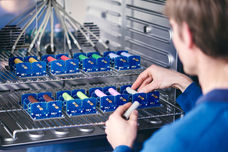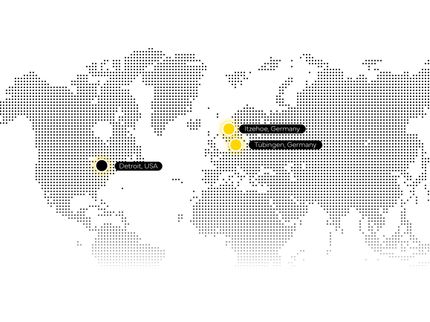Researchers Decode Reaction Mechanisms During Interphase Formation in Lithium Batteries
Origin of the Decomposition Product Methane More Complex Than Previously Assumed
Understanding all processes and reactions inside the lithium-ion battery in detail is essential for its further development. Especially interphases, which strongly influence the performance, safety and service life of energy storage systems, are still insufficiently investigated. They are particularly fragile and vulnerable to common methods for sample preparation. A team of MEET Battery Research Center led by scientist Marco Leißing has now used isotope labelling and gas chromatography to analyse the reaction pathways during formation. The researchers were thus not only able to confirm known reaction equations during interphase formation, but also provide new finding about the decomposition product methane.
Basic Approach for a Better Understanding of Interphase Formation
"The direct analysis of interphases and their formation is only possible to a very limited degree. Therefore, indirect methods are essential to draw conclusions from the occurring reactions and mechanisms," explains MEET PhD student Marco Leißing. "With our analysis, we provide a new, fundamental approach to investigate decomposition reactions during interphase formation."
The scientists focused on gaseous decomposition products, which are formed parallel to the interphase. Using gas chromatography, they were able to indirectly draw conclusions from the formation mechanisms in the cells. For this purpose, the researchers isotopically labelled the solvents as a component of the electrolyte. Since the solvents significantly influence the formation of interphases, the team was able to observe their path through the cells. "We can thus assign the decomposition products to their origin," says Leißing.
Complex Reactions Lead to the Decomposition Product Methane
Based on their investigations, the MEET researchers confirmed reaction equations from the literature, but also provided new understandings of the decomposition product methane (CH4). "The reactions that lead to the formation of methane are more complex than previously assumed," explains Leißing. Carbon and hydrogen atoms involved come from different parts of the electrolyte. The reaction pathways must now be identified more precisely in further research.
Original publication
Other news from the department science
These products might interest you

Battery Testing Services by Battery Dynamics
Learn more about the performance and service life of your battery cells in less time
Benefit from modern measurement technology and an experienced team

Batt-TDS by ystral
YSTRAL Batt-TDS mixing and dispersing machine
Boost your battery slurry process

Get the chemical industry in your inbox
By submitting this form you agree that LUMITOS AG will send you the newsletter(s) selected above by email. Your data will not be passed on to third parties. Your data will be stored and processed in accordance with our data protection regulations. LUMITOS may contact you by email for the purpose of advertising or market and opinion surveys. You can revoke your consent at any time without giving reasons to LUMITOS AG, Ernst-Augustin-Str. 2, 12489 Berlin, Germany or by e-mail at revoke@lumitos.com with effect for the future. In addition, each email contains a link to unsubscribe from the corresponding newsletter.
Most read news
More news from our other portals
See the theme worlds for related content
Topic world Gas chromatography
Gas chromatography is an essential method in analytical chemistry for the separation and analysis of volatile compounds. Due to its high resolution and sensitivity, it has become firmly established in areas such as environmental analysis, food chemistry or forensic science. GC provides precise and reliable results and enables deep insights into the chemical composition of samples.

Topic world Gas chromatography
Gas chromatography is an essential method in analytical chemistry for the separation and analysis of volatile compounds. Due to its high resolution and sensitivity, it has become firmly established in areas such as environmental analysis, food chemistry or forensic science. GC provides precise and reliable results and enables deep insights into the chemical composition of samples.
Topic World Battery Technology
The topic world Battery Technology combines relevant knowledge in a unique way. Here you will find everything about suppliers and their products, webinars, white papers, catalogs and brochures.

Topic World Battery Technology
The topic world Battery Technology combines relevant knowledge in a unique way. Here you will find everything about suppliers and their products, webinars, white papers, catalogs and brochures.
Last viewed contents

Recycling used tires using pyrolysis increases circularity and saves CO2
Expanding when it shouldn't - New material with exceptional negative compressibility




























































